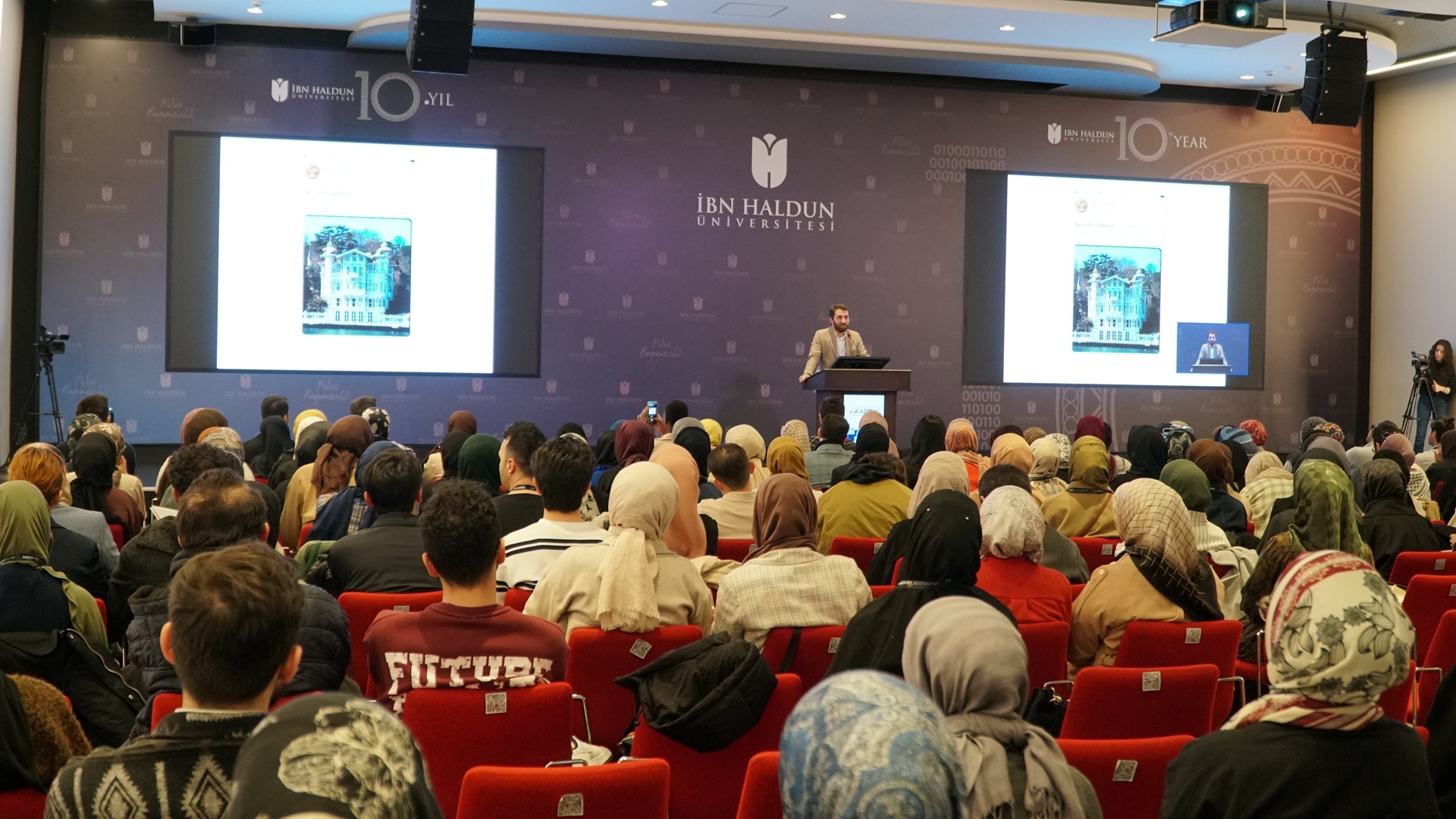


The İbn Haldun Academy '25 program, hosted by our university, is being held from April 19 to May 24, 2025, under the theme “Developing Culture and Climate.” This year, the Academy offers simultaneous face-to-face and online participation opportunities to participants from 140 different universities, attracting approximately 1,000 university students. The opening week of the Academy program began on Saturday, April 19, with four sessions held at the Media and Event Center Event Hall. Throughout the day, Prof. Halil Berktay, Assoc. Prof. Enis Doko, Assist. Prof. Elyesa Koytak, and Prof. Süleyman Seyfi Öğün discussed the transformative impact of cultural climate on individuals and society from different perspectives.
In the first session of the program, our Head of the History Department, Prof. Halil Berktay, evaluated the role of micro and macro affiliations in the intellectual and cultural development of individuals in his seminar titled "Developing and Non-Developing, Conservative and Creative Cultural Environments." Highlighting the importance of circles that have nourished intellectual and artistic production throughout history, Berktay explained the impact of cultural climate on individual creativity with examples such as non-Salon art circles in France, the Bloomsbury group in England, and the Blue Anatolia movement in Türkiye. He emphasized that creative climates are possible not only with individual geniuses but also with the social and cultural environments that nourish them. Prof. Berktay will continue to contribute with a second session on the same topic next week.
In the second session of the program, our Head of the Philosophy Department, Assoc. Prof. Enis Doko, focused on the questions "What kind of cultural climate do we live in?" and "What is the purpose of life?" in his presentation titled "Cultural Climate and the Formation of Virtuous Societies," starting from the aspects of ethos such as morality, tradition, and habit. He stated that modern culture directs individuals towards performance, image, and consumption, which pushes virtue and inner world construction to the background. Emphasizing that cultural climate is shaped by morality, tradition, and habits, Doko also noted that education has deviated from its original purpose and has become more market-oriented. In an era where media and the internet have surpassed family and educational institutions, Doko observed that moral values have become individualized and common norms have weakened. Referring to Aristotle's virtue ethics, he highlighted the view that happiness is only possible with lasting virtues. Doko reminded that building developing cultural climates is crucial for the future of society and will continue this seminar next week through Confucianism and Sufi thought.
In the third session of the program, poet and academician Assist. Prof. Elyesa Koytak shed light on the multi-layered meaning world of the concept of culture in social sciences in his conference titled "Culture, Difference, and Distinction: The Role of Culture in Social Transformation." Addressing the definitions of culture within a broad framework ranging from Levi-Strauss to Bourdieu, from Foucault to contemporary sociological approaches, Koytak emphasized that culture operates on many levels, from the way individuals relate to the world to the construction of social structure. In his speech, drawing attention to the "embodied," "objectified," and "institutionalized" forms of culture, he discussed how culture, as a form of capital, becomes a distinguishing social status element through the example of France. Referring to the cultural understandings of Ziya Gökalp, Mümtaz Turhan, and Nurettin Topçu in the context of Türkiye, he interpreted the dynamics of cultural conflict and transformation in the modernization process. He stated that culture also provides a ground for "difference and distinction." Illustrating the current reflections of cultural transformation with statistics such as the increasing rate of higher education and the rise in women's participation in universities in Türkiye, Koytak proposed analyzing culture through İbn Haldun's concepts of "asabiyya," "adat," "sanat," and "ulum." He concluded his speech by emphasizing that culture is not fixed but constantly changing and transforming.
In the fourth session, Prof. Süleyman Seyfi Öğün discussed the deep relationship between culture, geography, and history in his speech titled "On the Idea of Historical Basin." Starting with the meaningful attribution of the phrase "Geography is destiny" to İbn Haldun, although it does not belong to him, Öğün pointed out that the modern world produces minds without geography. He emphasized that this bond has weakened with the replacement of the traveler by the tourist, the elimination of magic by knowledge, and the objectification of the world. Underlining the concept of "basin," he defined it as a cultural proximity area where one does not feel alien. Öğün indicated that we are heirs to a common civilization basin, including regions such as the Balkans, Anatolia, Mesopotamia, and the Levant, through the Turkification and Islamization of Rome. He emphasized that movements such as Ottomanism, Turkism, and Islamism developed disconnected from the historical basin after the Second Constitutional Era. In the Republican period, he stated that the liquidation of the Ottoman and Seljuk heritage in the name of modernization deepened this disconnection further.
Attracting great interest with its opening sessions, İbn Haldun Academy will continue until May 24 with conferences by valuable experts in their fields.